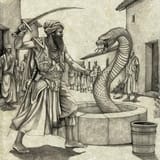>>514164762
>Hausa oral traditions detail the Bayajidda legend, which describes the adventures of the Baghdadi hero, Bayajidda, culminating in the killing of the snake in a well at Daura and his marriage to the local queen Magajiya Daurama. According to the legend, Bayajidda's descendants founded the Hausa Bakwai (seven "true" states), as well as the Hausa Banza ("bastard" or "illegitimate" states)
>According to the Bayajidda legend, the Hausa states were founded by the sons and grandsons of Bayajidda, a prince of Baghdad who married Daurama, the last Kabara of Daura, and heralded the end of the matriarchal monarchs that had erstwhile ruled the Hausa people
>According to the legend, Bayajidda travelled through Bornu, arriving at Daura, where he went to the house of an old woman called Waira and asked her to give him water but she told him the predicament of the land, how the only well in Daura, called Kusugu, was inhabited by a snake called Sarki, who allowed citizens of Daura to fetch water only on Fridays
>Since sarki is the Hausa word for "king", this may have been a metaphor for a powerful figure. Bayajidda killed Sarki and because of what he had done the queen married him for his bravery. After his marriage to Daurama the people started to call him Bayajidda which means "he didn't understand (the language) before"
>Chaoskampf (German: [ˈkaːɔsˌkampf]; lit.'the battle against chaos'), or the combat myth, is a widespread mythological motif involving battle between a culture hero deity with a chaos monster, often in the form of a sea serpent or dragon. The term was first used with respect to the destruction of the chaos dragon Tiamat in the Enūma Eliš, although the primeval state is one of a peaceful existence between Abzu and Tiamat and chaos only ensues when Tiamat enters combat with Marduk
